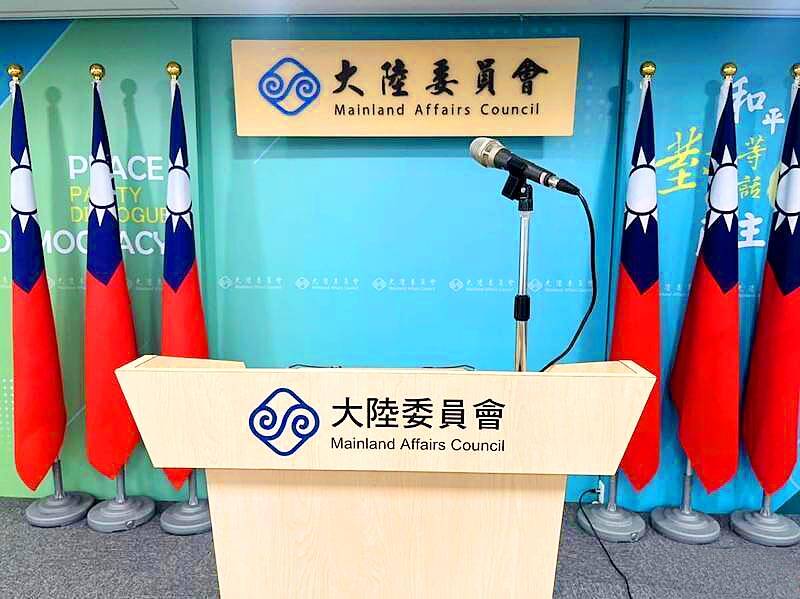The Mainland Affairs Council (MAC) has issued a new interpretation of a cross-strait act, specifying that holding a permanent residency certificate issued by China would also result in the loss of “Taiwan status.”
Article 9-1 of the Act Governing Relations Between the People of the Taiwan Area and the Mainland Area (臺灣地區與大陸地區人民關係條例) stipulates that “people of the Taiwan Area may not have household registrations in the Mainland Area,” and those who contravene this provision “shall be deprived of its status as the people of the Taiwan Area and its rights.”
In the new interpretation issued on Wednesday last week, the council said that “having [Chinese] household registrations” under the act should be understood to include holding a Chinese ID card and permanent residency certificate — an intermediate identification document valid for a certain period that allows holders to apply for a Chinese ID card.

Photo: Taipei Times
Given that the Chinese authorities use the concept of “permanent residency” as the basis for legal and administrative management, an individual who obtains a permanent residency certificate issued by China is therefore eligible to register for a household registration in China, the council said.
Such a move enables them to apply for a Chinese ID card, the same as the ones held by people of the Mainland Area, it said.
The interpretation was issued to uphold the “principle of maintaining a single status for individuals across the Taiwan Strait,” and to avoid “status confusion” that could disrupt cross-strait interactions and social order, the council said.
The council also said that the interpretation is based on the “legislative intent, regulatory purpose and contextual meaning” of the act.
By including Chinese permanent residency certificates, the new interpretation expands the previous scope, which covered Chinese household registrations, ID cards and passports.
However, holding a Chinese residency certificate does not contravene the act and its interpretation.
Mainland Affairs Council Minister Chiu Chui-cheng (邱垂正) in February said that the council was reviewing regulations and legal frameworks to strengthen oversight of Taiwanese citizens obtaining Chinese residency certificates, permanent residency certificates and ID cards, as the number of such cases continues to rise.
The potential amendments to the act would remind the public that applying for “various identification documents in China carries multiple risks,” Chiu said at the time.
Since February, the council, the Ministry of Civil Service and the Directorate-General of Personnel Administration have instructed government agencies to check whether active military personnel, civil servants and public-school teachers hold any Chinese-issued documents.
President William Lai (賴清德) last month announced 17 major strategies in response to “five major national security and united front threats” facing Taiwan.
One of the strategies tasks the council and other agencies with inspecting identification documents that Taiwanese military personnel, civil servants and public-school teachers might have applied for in China, as a way of preventing and deterring “united front” operations disguised as “integrated development,” a Presidential Office statement said.

Beijing could eventually see a full amphibious invasion of Taiwan as the only "prudent" way to bring about unification, the US Department of Defense said in a newly released annual report to Congress. The Pentagon's "Annual Report to Congress: Military and Security Developments Involving the People's Republic of China 2025," was in many ways similar to last year’s report but reorganized the analysis of the options China has to take over Taiwan. Generally, according to the report, Chinese leaders view the People's Liberation Army's (PLA) capabilities for a Taiwan campaign as improving, but they remain uncertain about its readiness to successfully seize

Taiwan is getting a day off on Christmas for the first time in 25 years. The change comes after opposition parties passed a law earlier this year to add or restore five public holidays, including Constitution Day, which falls on today, Dec. 25. The day marks the 1947 adoption of the constitution of the Republic of China, as the government in Taipei is formally known. Back then the Chinese Nationalist Party (KMT) governed China from Nanjing. When the KMT, now an opposition party in Taiwan, passed the legislation on holidays, it said that they would help “commemorate the history of national development.” That

Taiwan has overtaken South Korea this year in per capita income for the first time in 23 years, IMF data showed. Per capita income is a nation’s GDP divided by the total population, used to compare average wealth levels across countries. Taiwan also beat Japan this year on per capita income, after surpassing it for the first time last year, US magazine Newsweek reported yesterday. Across Asia, Taiwan ranked fourth for per capita income at US$37,827 this year due to sustained economic growth, the report said. In the top three spots were Singapore, Macau and Hong Kong, it said. South

Snow fell on Yushan (Jade Mountain, 玉山) yesterday morning as a continental cold air mass sent temperatures below freezing on Taiwan’s tallest peak, the Central Weather Administration (CWA) said. Snowflakes were seen on Yushan’s north peak from 6:28am to 6:38am, but they did not fully cover the ground and no accumulation was recorded, the CWA said. As of 7:42am, the lowest temperature recorded across Taiwan was minus-5.5°C at Yushan’s Fengkou observatory and minus-4.7°C at the Yushan observatory, CWA data showed. On Hehuanshan (合歡山) in Nantou County, a low of 1.3°C was recorded at 6:39pm, when ice pellets fell at Songsyue Lodge (松雪樓), a